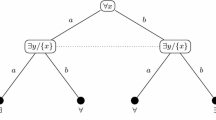Abstract
In this article we investigate the family of independence-friendly (IF) logics in the equality-free setting, concentrating on questions related to expressive power. Various natural equality-free fragments of logics in this family translate into existential second-order logic with prenex quantification of function symbols only and with the first-order parts of formulae equality-free. We study this fragment of existential second-order logic. Our principal technical result is that over finite models with a vocabulary consisting of unary relation symbols only, this fragment of second-order logic is weaker in expressive power than first-order logic (with equality). Results about the fragment could turn out useful for example in the study of independence-friendly modal logics. In addition to proving results of a technical nature, we address issues related to a perspective from which IF logic is regarded as a specification framework for games, and also discuss the general significance of understanding fragments of second-order logic in investigations related to non-classical logics.
Similar content being viewed by others
References
Caicedo X., Dechesne F., Janssen T.M.V.: Equivalence and Quantifier Rules for Logic with Imperfect Information. Logic Journal of the IGPL 17(1), 91–129 (2009)
Casanovas E., Dellunde P., Jansana R.: On Elementary Equivalence for Equality-free Logic. Notre Dame Journal of Formal Logic 37(3), 506–522 (1996)
Dickson L.E.: Finiteness of the Odd Perfect and Primitive Abundant Numbers with n Distinct Prime Factors. American Journal of Mathematics 35(4), 413–422 (1913)
Galliani, P., Game Values and Equilibria for Undetermined Sentences of Dependence Logic, M.Sc. thesis, ILLC, 2008.
Henkin, L., Some Remarks on Infinitely Long Formulas, in Infinitistic Methods: Proceedings of the Symposium on Foundations of Mathematics, Warsaw, 29 September 1959, Pergamon Press, 1961, pp. 167–183.
Higman, G., Ordering by Divisibility in Abstract Algebras, in Proceedings of the London Mathematical Society 1952, 2:326–336, 1952.
Hintikka J.: Quantifiers vs. Quantification Theory. Dialectica 27, 329–358 (1973)
Hintikka, J., and G. Sandu, Informational Independence as a Semantical Phenomenon. In J. E. Fenstad et al., (eds.), Logic, Methodology and Philosophy of Science VIII, volume 126 of Studies in Logic and the Foundations of Mathematics, North- Holland, 1989, pp. 571–589.
Kontinen, Jarmo, Coherence and Complexity in Fragments of Dependence Logic. Ph.D. thesis, ILLC, 2010.
Kontinen, Juha, and V. Nurmi Team Logic and Second-Order Logic, In Proceedings of WoLLIC 2009, Springer Lecture Notes in Computer Science 5514, 2009.
Kontinen, Juha, and J. Väänänen, On Definability in Dependence Logic, Journal of Logic, Language and Information 18(3):317–332, 2009.
Libkin, L., Elements of Finite Model Theory, Springer, 2004.
Malicki M., Rutkowski A.: On Operations and Linear Extensions of Well Partially Ordered Sets. Order 21(1), 7–17 (2004)
Mann A. L.: Independence-Friendly Cylindric Set algebras. Logic Journal of the IGPL 17(6), 719–754 (2009)
Mann, A. L., G. Sandu, and M. Sevenster, Independence-Friendly Logic: A Game-Theoretic Approach, London Mathematical Society Lecture Note Series (No. 386), Cambridge University Press, 2011.
Tulenheimo, T., and M. Sevenster, Approaches to Independence Friendly Modal Logic, in J. van Benthem, D. Gabbay, and B. Löwe, (eds.), Interactive Logic, Selected Papers from the 7th Augustus de Morgan Workshop, London. Texts in Logic and Games 1, Amsterdam: Amsterdam University Press, 2007, pp. 247–280.
Tulenheimo, T., Independence Friendly Modal Logic. Ph.D. thesis, Department of Philosophy, University of Helsinki, 2004.
Väänänen, J., Dependence Logic, Vol. 70 of London Mathematical Society Student Texts, Cambridge University Press, 2007.
Author information
Authors and Affiliations
Corresponding author
Rights and permissions
About this article
Cite this article
Kuusisto, A. Expressivity of Imperfect Information Logics without Identity. Stud Logica 101, 237–265 (2013). https://doi.org/10.1007/s11225-013-9482-7
Published:
Issue Date:
DOI: https://doi.org/10.1007/s11225-013-9482-7




